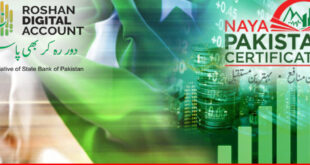While the credit penetration stands at 1/5th of the gross domestic product of the country, the future of the banking sector does not seem to be a very positive one based on raw numbers. With the economy of Pakistan already being burdened by the numerous protests against the existing government and the recurring floods, while an in-depth look into data pertaining to the banking sector, however, reveals a different story.
Banks operating in the country are expected to face increases in their earnings in the upcoming years primarily due to the revival of business activities in the country. According to a banking sector analyst, it is the local banks of the country which are going to be the key entity to earn advantages from the recovery of the economy from its present state.
During the past five years, increases have been seen in the deposits of commercial banks at a compound annual growth rate of 14.6 percent. The deposits of banks also increased by 13 percent on a year over year basis at the end of June, which is considered to be less than what was expected however. This decline was seen to be due to slow growth in the money supply as well as due to the reevaluation of foreign currency after the rupee appreciated against the dollar.
Considering banks whose assets exceed the value of Rs500 billion, Bank Alfalah and Habib Bank were the ones in this category ,which experienced an expansion in their deposits by 15.9 percent and 15.2 percent respectively, over the 12 month period ending June 30th, 2014. Apart from these, Allied Bank, United Bank and MCB Bank also experienced a significant amount of expansion in their deposits; 13.3%, 13.1% and 12.4% each respectively. The only bank which experienced a decline in its deposits was National Bank, which experienced a 0.6% year on year basis decline in deposits.
The condition of the country in 2008 due to the financial meltdown caused the banking sector of the country to experience dread and due to which, a number of investors were scared off. While investors had been scared away, economic growth was also slow and the business climate was not such which would attract potential businessmen. This further caused the demand for credit to decline and caused banks to be unwilling to lend. Due to this purpose, during the period between 2009 and 2013, the compound annual growth rate of the country’s banking sector pertaining to advances made occurred at 5% and reached Rs3.9 trillion by the end of 2013. This was very much in contrast to the 10 year average which had been valued at 13.3%.
This year, however, according to analysts was seen to be one in which the highest growth rate in bank advances was experienced over the past six years. Not only did the demand for credit increase but improvements in economic outlook of the country combined resulted in the advances to increase by 12.5% year on year by the end of June.
Following the crisis in 2008, commercial banks experienced an increase in the needs of government borrowing and a decline in the demand for credit by the private sector; something which was considered to be an obvious consequence. Due to this purpose, risk aversive banks began to put their funds in investments which were considered to be free of risk and at the same time had attractive yields. This caused investments by banks to rise and this increased further during the equity market boom which occurred in 2012-2-013.
Considering present times, in order to further strengthen the banking sector of the country, Prime Minister Nawaz Sharif has invited Chinese entrepreneurs to enter into the market in Pakistan along with their businesses and economic investment opportunities to further promote the banking sector of the country. During the PM’s visit to China for an international dialogue, not only did he meet with the president but the two also linked contracts worth billions of dollars pertaining to sectors such as infrastructure, energy, shipping and roads. While it is unlikely that these contracts are going to be enough to fulfill the requirements of the country in terms of energy demand, it would certainly help in strengthening the connectivity linkages of communication in infrastructure networks. Not only would such energy projects bring about benefit for Pakistan by offering good returns on investment, both the Chinese and Pakistani banking and financing institutions would face benefits.
Another aspect worth considering is the recent show of interest by Germany in wanting to invest in the country, particularly in the energy sector of the country. While the German Chancellor Angela Merkel clearly showed interest, she also pointed out that it was the security conditions of Pakistan which was seen to be a major deterrent.
German firms, being leaders in the renewable energy technology in the world are keen to invest in Pakistan. Germany is also the fourth largest trading partner of the country and the largest in the European Union. In the previous year, trade between the two countries stood at a value of 1.9 billion euros with Germany exporting chemical products, machinery and vehicles and Pakistan exporting leather goods, basmati rice and textiles mostly.
While the Prime Minister Nawaz Sharif seems hopeful about the relationship between Pakistan and Germany, only the future will tell what these relations bring about for Pakistan. The countries have already decided to continue on working towards higher education, however, Germany investing in Pakistan and bringing opportunities in for the country is yet to be seen. It is likely that if the security threat is curtailed to a great extent, not only would businessmen from Germany come into the country, bringing with them incredible opportunities but so would other countries.
 PAGE Blog Business Weekly Magazine
PAGE Blog Business Weekly Magazine

